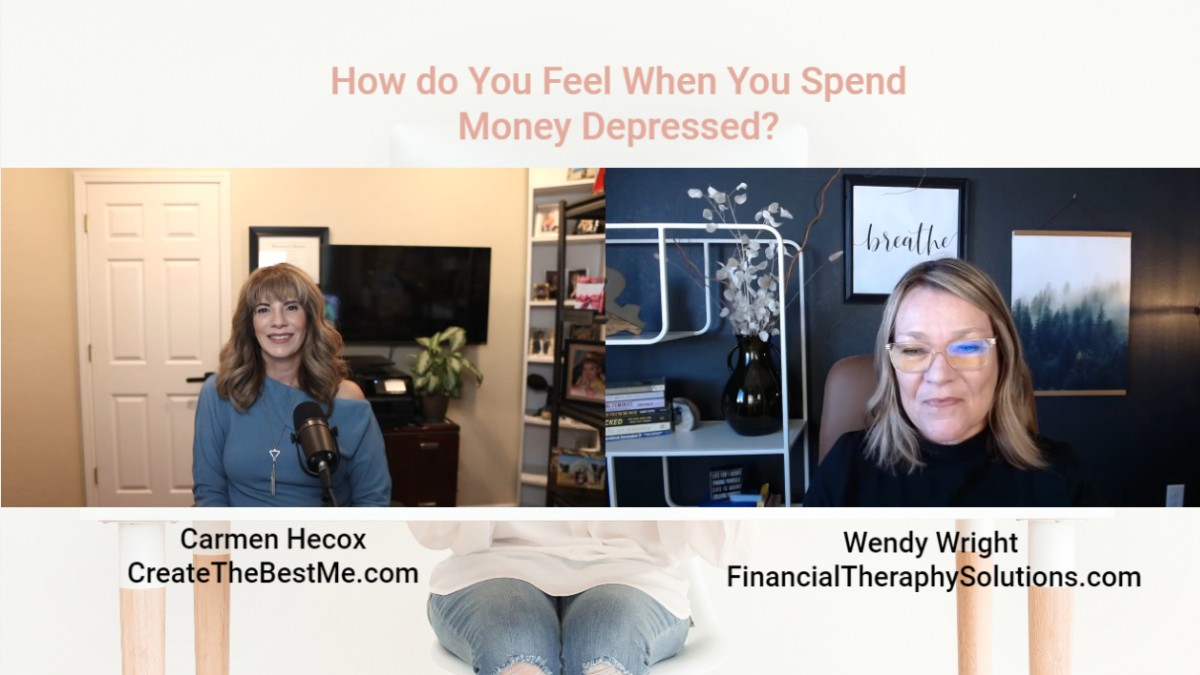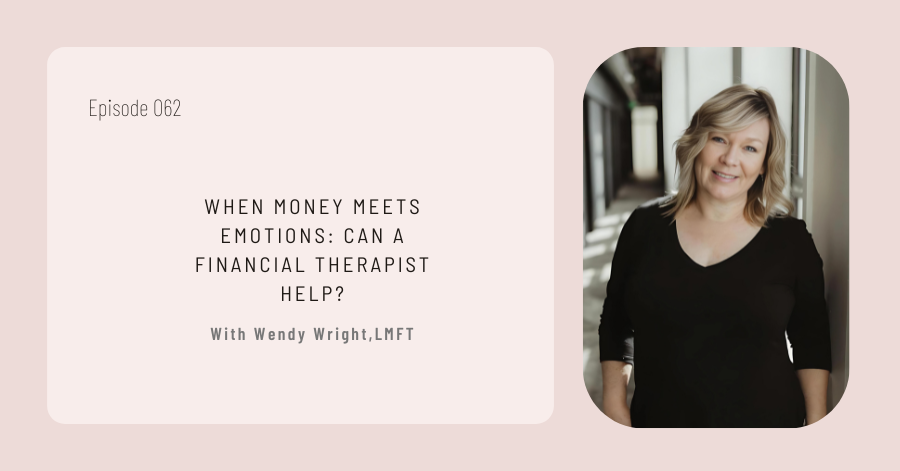When Money Meets Emotions: Can Financial Therapy Help?
Delving into Financial Therapy with Expert Wendy Wright
Imagine standing at a crossroad where every path you see is woven with your financial decisions. Now, imagine having someone who could help you understand not just the paths but how your feelings about each path might be affecting your journey. This is where a financial therapist comes into play.
Today, I'm thrilled to share a conversation with Wendy Wright, a pioneer in the field of financial therapy. Wendy's expertise lies in blending psychology with financial decision-making to help individuals uncover and conquer the emotional ties that often distort our financial views and decisions. So, if you've ever found yourself puzzling over your financial choices or feeling stuck in your financial journey, this discussion could be a game-changer for you.

Meet Wendy Wright, Financial Therapist and Visionary
Allow me to introduce a remarkable guest, Wendy Wright, whose unique expertise in financial therapy is transforming lives. With a dynamic background as a licensed therapist, money coach, author, and entrepreneur, Wendy stands out as a visionary in her field. Her journey into financial therapy began with her roles as a mortgage loan officer and business owner, experiences that gave her deep insights into the financial behaviors of individuals. Additionally, her extensive background as a Licensed Marriage and Family Therapist enriches her ability to integrate psychological wisdom with financial advice.
Wendy's professional path is distinguished not only by her credentials but also by her innovative approach to financial well-being. At the helm of Financial Therapy Solutions, LLC, based in Denver, CO, she offers services both virtually in the US and internationally, making her insights accessible to a global audience. Wendy's method involves a pioneering blend of psychology and finance aimed at helping clients break through the psychological barriers that obstruct financial growth. Her development of the Money Mindset Shift© program illustrates her commitment to fostering healthier relationships with money, guiding individuals toward greater financial clarity and empowerment.

Understanding Financial Therapy
Delving into the realm of financial therapy, Wendy elucidates this relatively new discipline as the intersection of money and emotions. She posits that our financial decisions are seldom just about the numbers; rather, they are deeply entwined with our emotional lives. Financial therapy, therefore, seeks to address the root psychological factors that influence one's financial behaviors. This approach helps individuals recognize and modify emotional patterns that adversely affect their financial health.
Wendy explained that many people experience intense emotional reactions related to money, such as anxiety, frustration, or even denial, which often go unaddressed in traditional financial counseling. Through financial therapy, individuals can explore these reactions in a safe, non-judgmental environment, learning to understand and manage their emotional responses to money effectively. This therapeutic process not only aids in alleviating financial stress but also in making more informed and conscientious financial decisions.
By focusing on this intricate relationship between our financial actions and emotional responses, Wendy's practice offers a comprehensive solution that traditional financial advising often overlooks. Her work exemplifies the transformative potential of financial therapy, making it an invaluable resource for anyone looking to achieve both financial and emotional well-being.

The Emotional Ties to Financial Decisions
Wendy delved deeply into the emotional ties that profoundly affect our financial decisions. She explained that our interactions with money often extend beyond mere transactions; they are closely linked to our emotional responses and psychological states. For instance, feelings of anxiety or excitement can significantly influence how we approach spending, saving, or investing. Wendy's approach in financial therapy focuses on uncovering these emotional underpinnings to better understand and reshape one's financial behaviors.
During our conversation, Wendy illustrated how common emotional responses to money—such as stress from debt or euphoria from spending—can lead to financial decisions that might not align with one's long-term goals. She emphasized that understanding these emotional drivers is crucial because they often dictate our financial behaviors more than we realize. For example, a person who experiences anxiety about financial security might compulsively save, avoiding necessary or beneficial expenditures, while someone who finds joy in shopping may spend beyond their means.
Wendy's method involves encouraging individuals to observe and reflect on their feelings about money regularly. By asking questions like, “What did you notice about your feelings towards money this week?” she helps clients become more aware of their habitual emotional reactions to financial situations. This heightened awareness is the first step towards changing detrimental financial behaviors.
This approach not only aids in managing finances better but also in achieving a healthier balance with money. By addressing the emotional aspects of finance, Wendy helps her clients move towards a state where their financial decisions are more deliberate and aligned with their overall life goals, rather than being sporadic reactions to emotional states. This part of financial therapy is pivotal, as it transforms one's relationship with money from one of potential stress and confusion to one of clarity and empowerment.
Join our community
Connect with like-minded individuals.
The Difference Between Financial Therapy and Financial Advice
Wendy skillfully highlighted the fundamental differences between financial therapy and traditional financial advice, clarifying the unique role of a financial therapist. Financial advice typically involves strategic financial planning, where advisors recommend products, investments, or savings plans based on a client’s financial goals. Financial advisors often meet with clients periodically to review financial progress and adjust plans accordingly. Their primary focus is on financial products and the optimization of financial assets.
In contrast, financial therapy centers on the emotional and psychological aspects of money management. Wendy stressed the importance of understanding the client's emotional relationship with money, which can often influence financial behaviors more significantly than the financial strategies themselves. For instance, a financial therapist might explore why a client feels overwhelmed or anxious when making financial decisions or why they might avoid certain financial discussions altogether. This therapeutic approach can involve discussions about personal fears, family histories, or deep-seated beliefs about money, which are rarely addressed in typical financial advisory settings.
Wendy also mentioned the interplay between coaching and therapy in her practice. While she might offer practical financial coaching at times, her primary focus remains on the emotional responses and the underlying reasons that shape a client's financial decisions. This dual approach allows her to address not just the ‘how’ but the ‘why’ behind financial actions, providing a holistic service to her clients.

Personal Insights and Shared Experiences
Wendy shared fascinating insights from her own career journey, which uniquely positioned her to pioneer the field of financial therapy. With a background as a mortgage loan officer, a business owner, and a licensed marriage family therapist, she has an expansive view of the financial and psychological challenges individuals face. Her experience has taught her the importance of a comfortable and open dialogue about money, a topic that is often taboo or stress-inducing for many.
Wendy also drew parallels between her work with eating disorders and financial behaviors, noting that just as eating disorders are not solely about food, financial issues are often not just about money. This realization came from observing her patients' behaviors, where she noticed similar compulsive patterns between how they dealt with food and money. This insight led her to explore and eventually help develop the field of financial therapy, aiming to treat not just the symptoms but the root causes of financial distress.
These personal experiences and shared examples highlight Wendy’s deep understanding of the psychological elements that influence financial decisions. Her approach goes beyond traditional methods, offering a more comprehensive and empathetic understanding of financial management, which she believes can lead to more sustainable and positive financial behaviors. Through her work, Wendy continues to illuminate the often-overlooked emotional aspects of finance, making a profound impact on how her clients view and manage their money.

Addressing Financial Fears
A significant part of my discussion with Wendy focused on addressing the common fears and anxieties that people have about money. Wendy explained that these fears often stem from deeper emotional issues that can significantly affect financial decision-making. For many, talking about money can evoke a range of emotions, from anxiety and fear to shame and inadequacy. Wendy's approach in financial therapy is to create a safe, non-judgmental space where individuals can explore these feelings, understand their origins, and learn to manage them more effectively.
For example, Wendy described how different individuals react to money based on their unique emotional backgrounds. These reactions can manifest as a reluctance to check bank balances or a tendency towards impulsive spending. Through financial therapy, individuals learn to identify these patterns and the emotions driving them, which is the first step towards changing their financial behaviors.
Wendy's work emphasizes not just the practical aspects of money management but also the importance of emotional wellness in financial health. She helps her clients to see that overcoming their financial fears isn't just about gaining more financial knowledge or skills, but about transforming their emotional relationship with money.
Closing Thoughts: A Call to Action
Reflecting on my insightful conversation with Wendy Wright, it becomes clear that financial therapy offers a powerful tool for those looking to deepen their understanding of their financial behaviors and overcome the emotional hurdles that obstruct financial success. Wendy's expertise in addressing the psychological aspects of finance is invaluable, providing both clarity and empowerment to those she works with.
For anyone feeling stuck or overwhelmed by their financial situation, considering financial therapy could be a transformative step. It's an opportunity to not just manage your finances more effectively, but also to improve your overall emotional well-being.
As a special offer to our listeners and readers, Wendy has generously provided a 20% discount code for her transformative workbook, “Healing Through Money And Food Connection.” This resource is designed to help you explore the intricate relationship between your financial behaviors and emotional patterns. To take advantage of this offer, simply use the promo code CREATETHEBESTME20PERCENT when purchasing.
If today's discussion resonated with you and you're curious to learn more about Wendy Wright and her services or to subscribe to updates and resources, visit FinancialTherapySolutions.com.
Don't forget to subscribe to our channel for more insightful episodes that empower you to create the best version of yourself, no matter where you are in life.
Watch the complete interview here.

Resources Mentioned:
20% Off Discount Link to Financial Therapy Solution Products
Healing Through the Money and Food Connection
Free Offer: Intentional Shopping Exercise
Financial Therapy Solutions Instagram
Financial Therapy Solutions Facebook
“Financial Recovery,” by Karen McCall
“All Your Worth,” by Elizabeth Warren & Amelia Warren Tyagi
Subscribe to Apple Podcasts, and don't forget to Rate and Review
Like what you heard? If so, please rate and comment on Apple Podcasts. And while you are there, let me know what you want to hear next.
And while you are there, don't forget to hit Subscribe.



